Also check out our latest Alumni Reports on the Consumer Goods, and Consulting industries.
What Are The Contents of This Report?
This report has been split into two clusters based on the years in which the top b-schools considered for this report were established. The rationale behind such as a selection criterion is to ensure that the alumni base is strong and comparable for the b-schools under comparison. For a more detailed explanation, please refer to the section titled 'Methodology' in this report.
The report has been further split into two sub-clusters for each of the two primary clusters. These two sub-clusters are:
- Company-wise Slicing, i.e., the percentage of alumni of all b-schools at a particular company (view row-wise).
- B-School wise Slicing, i.e., the percentage of alumni of a particular b-school at all companies (view column-wise).
Before you get lost in the numerous tables and tonnes of data in this report, don't forget to sign-up for the last (but most definitely not the least) series of sessions in the Marketing Festival of 2020: How To Build An E-Commerce Brand - conducted by Pragya Batra (ex-Bain & Co., Ex-InMobi, INSEAD alumna).

Enroll now and get insights and career advice from the best in the business!
Analysis For B-Schools Established Before 1966
Given below is the raw data from LinkedIn for the 8 Schools in this cluster of schools established prior to 1966.
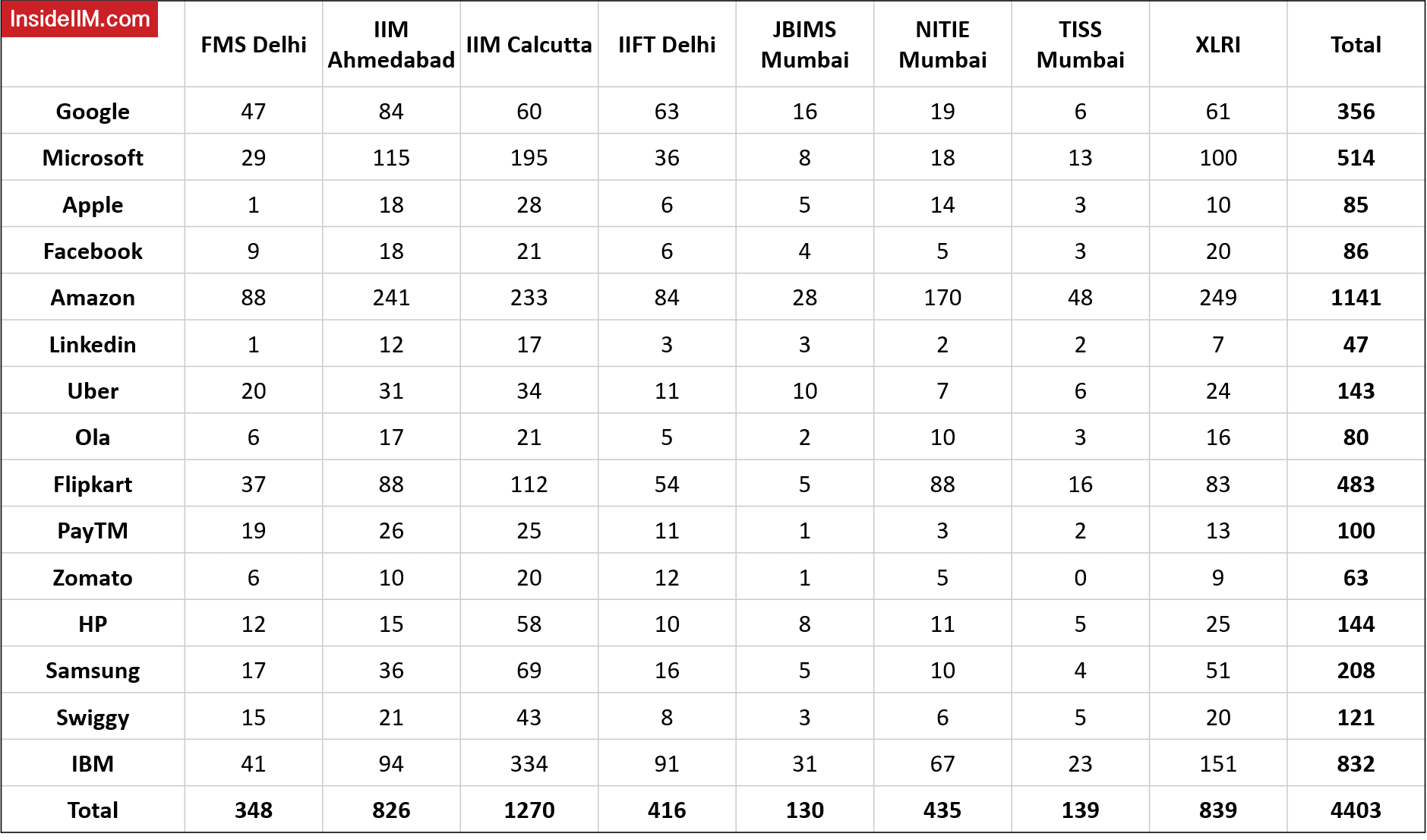
The table above comprises the raw data for Indian business schools established prior to 1966. Please note the following:
- While relevant filters regarding roles and domains were applied in the research process, the existence of anomalies is possible. Therefore, there may be a positive or negative variance from the actual figures.
- All possible businesses of the companies have been considered. For instance, numbers under ‘Amazon’ consist of relevant employees at Amazon, Amazon Web Services etc.
- In this report, a higher number does not equal more influence of alumni of specific business schools. The seniority of alumni, quality and diversity of roles play a bigger part. Unfortunately, this cannot be captured with exact accuracy given the paucity of time and subjectivity involved.
Key Observations:
- In terms of absolute numbers, the top-3 largest recruiters are Amazon, IBM and Microsoft, with 1/4th of the total alumni present at Amazon.
- IIM Calcutta has the highest number of alumni representation across all the technology and e-commerce companies selected for the analysis, as per available data.
Company-Wise Slicing: Alumni Of Top Business Schools As A Percentage Of The Total Number Of Alumni Of Each Company
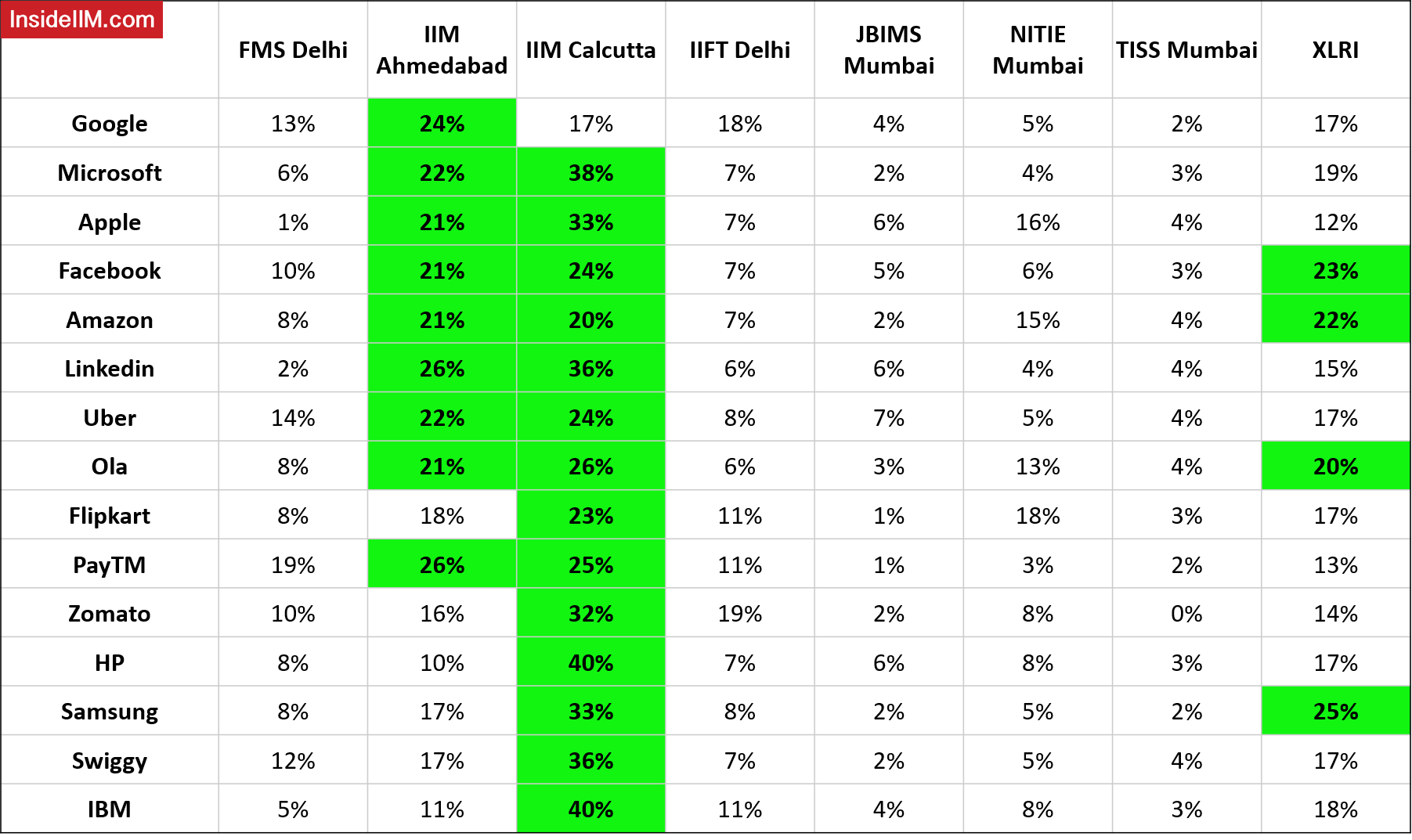
Cells for companies where %age of total alumni of a B-school ≥ 20% have been highlighted in Green.
Key Takeaways:
- IIM Calcutta, IIM Ahmedabad and XLRI clearly stand out in this category. Barring Google, at least 1 in 5 alumni of different business schools working in that specified company belong to IIM Calcutta. Similarly, barring HP and IBM, at least 1 in 6 alumni belong to IIM Ahmedabad. As for XLRI, a major concentration of alumni is at Samsung, Facebook and Amazon.
- TISS Mumbai alumni have almost no representation at Zomato, as per available data. Compared to other business schools in this cluster, the concentration of alumni from JBIMS and TISS Mumbai is fairly low.
- NITIE Mumbai has major concentration of alumni at a few companies which include Flipkart, Amazon, Apple and Ola. IIFT Delhi's alumni presence it’s majorly Google and Zomato. The presence of FMS Delhi graduates is majorly at PayTM, Uber, Google and Swiggy.
School-Wise Slicing: Alumni of Top Business Schools As A Percentage Of Overall No. Of Alumni Of Respective B-Schools
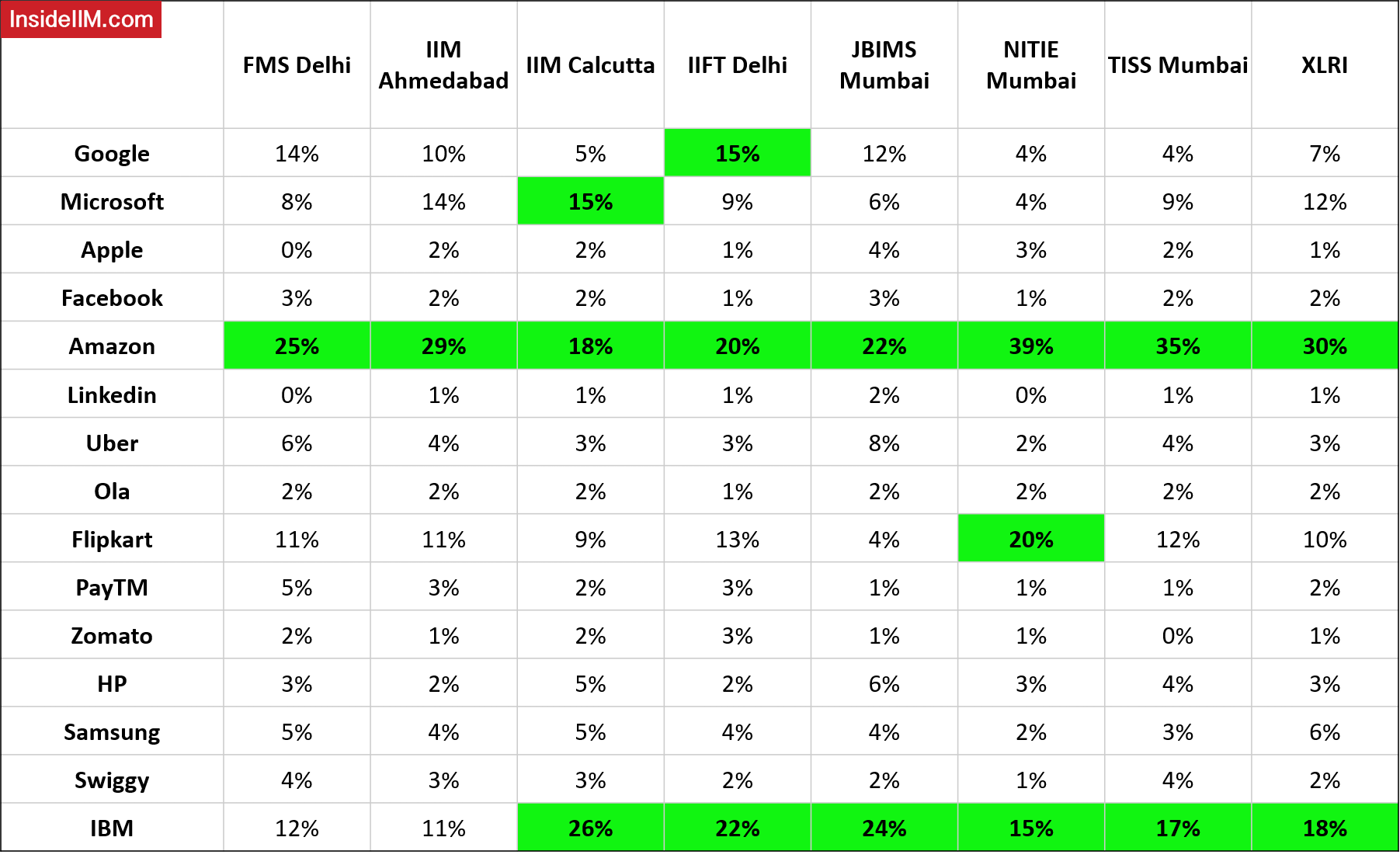
Cells for companies where %age of total alumni of a B-school ≥ 15% have been highlighted in Green.
Key Takeaways:
- Amazon and IBM emerge as the largest recruiters, with alumni of every single b-school in this cluster present in significant numbers at Amazon and IBM.
- Representation of alumni across all the selected institutes in companies like Apple, Facebook Ola, LinkedIn and Zomato is very low compared to other companies.
- Indian companies like PayTM, Zomato, Swiggy and Ola still have very low representation of alumni from the top b-schools when compared to some of the MNCs on the list. One reason might be that these Indian companies are relatively new compared to other companies considered for this report.
Analysis For B-Schools Established After 1966
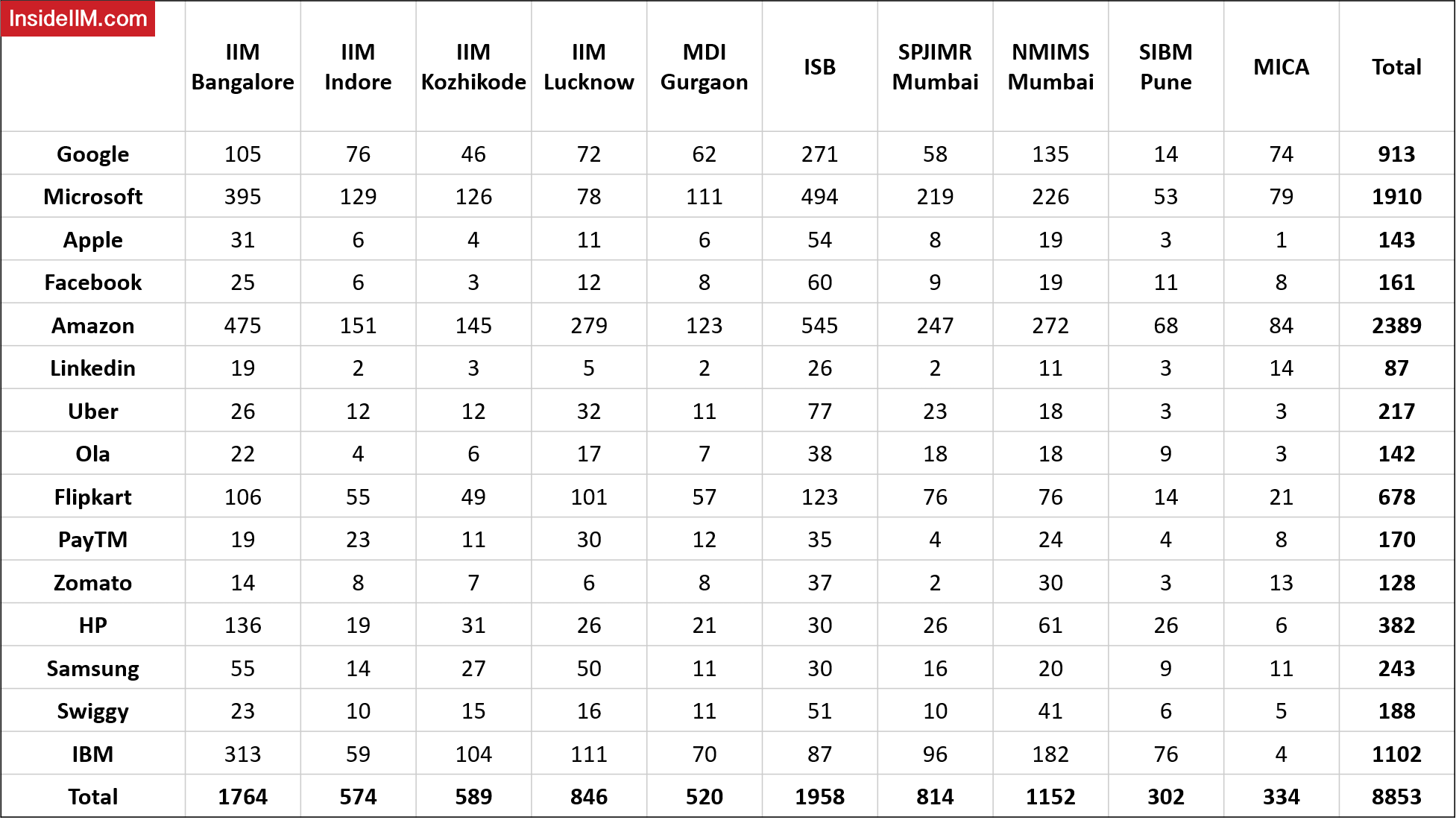
The table above comprises the raw data for Indian business schools established post-1966. Please note the following:
- Relevant filters on roles and domains have been applied in the research process. However, the existence of anomalies is also quite possible. So, there can be a positive or negative variance from the actual figures.
- All possible businesses of the companies have been considered. For instance, numbers under ‘ITC’ consist of relevant employees at consumer goods, infotech, Hotels, etc.
- In this report, a higher number does not equal more influence on alumni of specific business schools. The seniority of alumni, quality and diversity of roles play a bigger part. Unfortunately, this cannot be captured with exact accuracy given the paucity of time and subjectivity involved.
- The figures at NMIMS Mumbai may be heavily influenced by the alumni of NMIMS who may have pursued a non-MBA undergraduate degree from NMIMS, though the filters applied during the research will minimise such anomalies.
- The data for IIM Kozhikode are to be treated with caution, given previous technical glitches resulting in incorrect mapping IIM K alumni on LinkedIn.
Key Observations:
- In terms of absolute numbers, the top-3 largest recruiters are Amazon, IBM and Microsoft, with a quarter of the total alumni present at Amazon.
- ISB has the highest number of alumni representation across all the technology and e-commerce companies selected for analysis, followed by IIM Bangalore and NMIMS Mumbai.
Company-Wise Slicing: Alumni Of Top Business Schools As A Percentage Of The Total Number Of Alumni Of Each Company
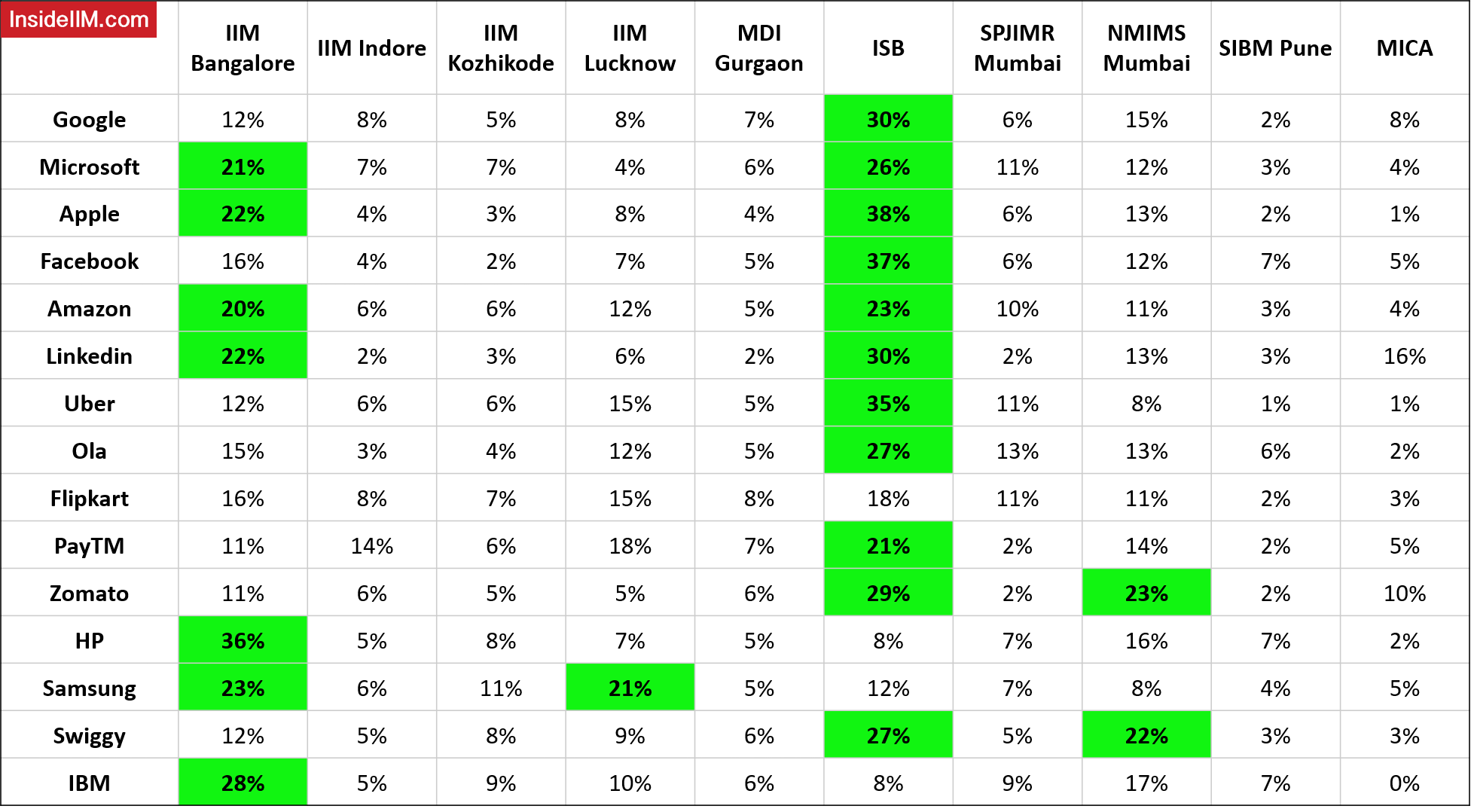
Cells for companies where %age of total alumni of a B-school > 20% have been highlighted in Green.
Key Observations:
- In this cluster, ISB and IIM Bangalore come out as clear winners. At 9 out of 15 companies selected, more than 15% of the total alums across different business schools working in that specified company belong to IIM Bangalore. Similarly, for 11 out of 15 companies on the list, at least 1 in 5 alumni across different companies belong to ISB.
- IIM Indore has a significant percentage of representation at PayTM, IIM Kozhikode at Samsung, and MICA at LinkedIn.
- HP is highly concentrated with alums from IIM Bangalore. Similarly, Google appears to be a major recruiter at ISB and has far alumni greater numbers compared to other institutes included in this cluster.
School-Wise Slicing: Alumni of Top Business Schools As A Percentage Of Overall No. Of Alumni Of Respective B-Schools
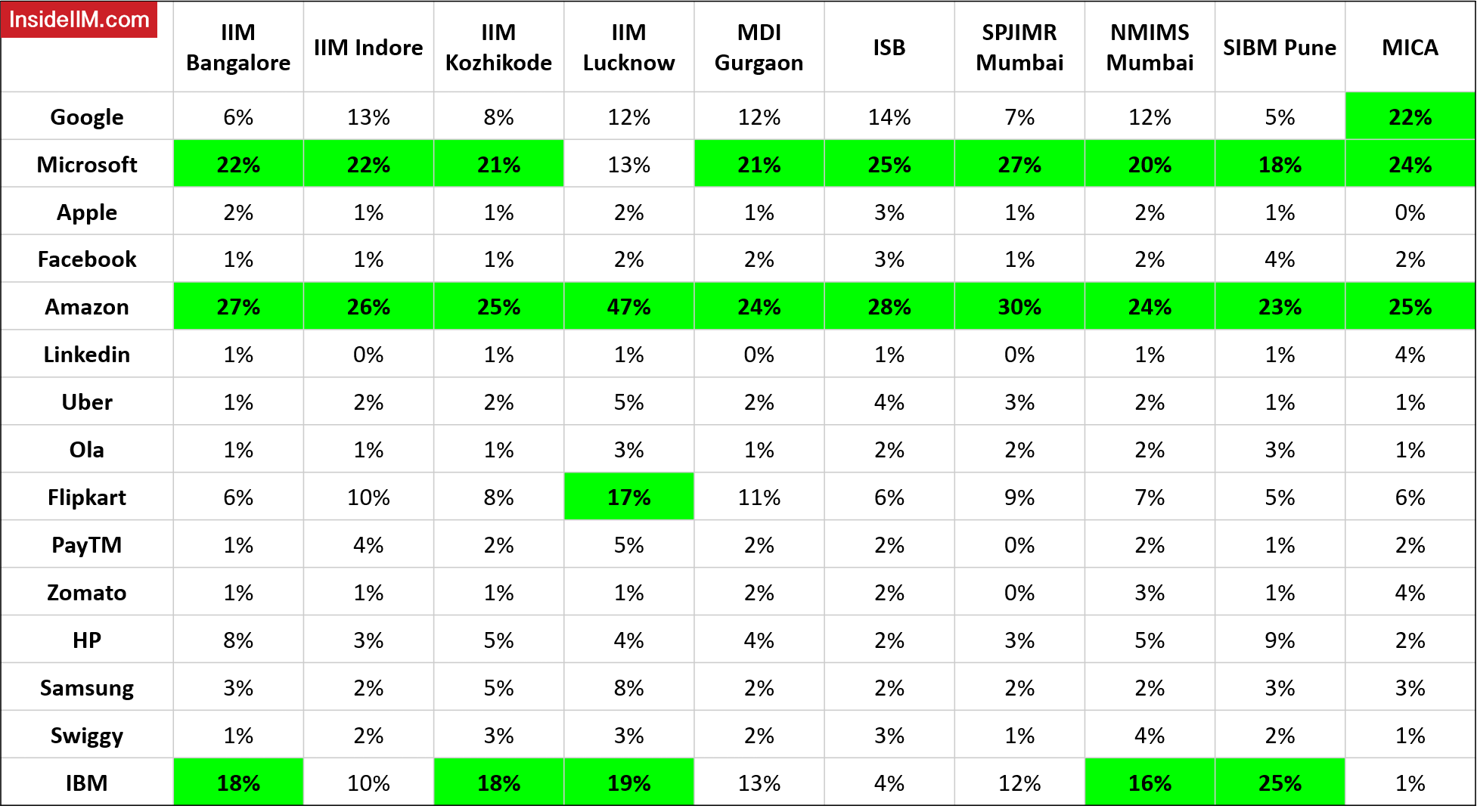
Cells for companies where %age of total alumni of a B-school ≥ 15% have been highlighted in Green.
Key Takeaways:
- Microsoft and Amazon emerge as the largest recruiters, with alumni of every single b-school in this cluster present in significant numbers at Microsoft and Amazon. IBM comes in at 3rd with a good representation of alumni of all business schools, with the exception of ISB and MICA.
- Indian companies like PayTM, Zomato, Swiggy and Ola still have very low representation of alumni from the top business schools when compared to some of the MNCs on the list. One reason might be that these Indian companies are quite new compared to the multinationals on the list.
- SPJIMR has no representation in LinkedIn, PayTM and Zomato, IIM Indore has none at LinkedIn, and MICA has none at Apple.
Methodology
B-School & Company Selection
The various ‘top business schools’ in this report have been picked up from the InsideIIM MBA Rankings for 2020. The various companies in this report are the Top-15 companies from our report on the Most Desirable FMCG Companies of 2019/2020.
Cluster-wise Segmentation
In order to ensure that the alumni base of the various business schools is comparable and not vastly different, we segmented the 18 business schools in this report into 2 clusters: Pre-1966 and Post-1966. As there was no top B-school established between 1965 and 1973, the cut-off year chosen for dividing the schools is taken to be 1965.
The following business schools have been considered for this report:
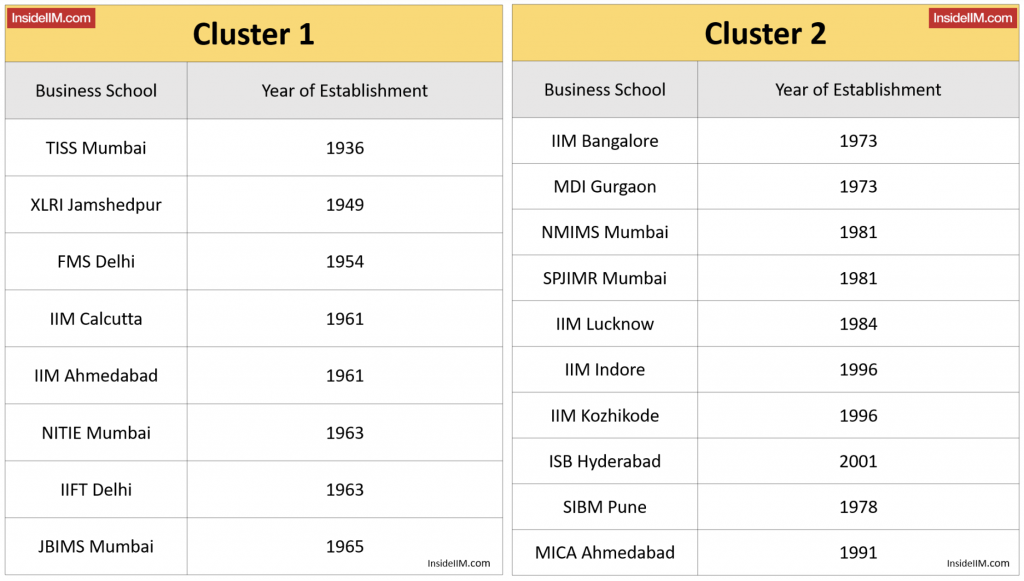
Limitations Of The Report
As mentioned at the beginning, certain limitations of the research process prevent us from arriving at conclusions with pinpoint accuracy. Two major limitations are:
- Not everyone is on LinkedIn B-school alumni may not necessarily have registered on LinkedIn, therefore not giving a comprehensive overview of the actual figures of alumni concentration at some of the world’s most well-known and reputed Technology and E-Commerce companies. It is also possible that those on LinkedIn may not necessarily update their profiles, thereby giving erroneous or incomplete employment data.
- Not everyone is a B-school student: Unfortunately, LinkedIn does not allow one to filter out MBA graduates from the crowd, and therefore, it is difficult to distinguish between MBA alumni and those who have pursued a certificate course, those who have pursued a short-term duration program, or summer internships at the companies mentioned in this report. Additionally, for institutes such as NMIMS Mumbai that offer multiple courses, there are chances of errors in attempting to distinguish between NMIMS alumni who have pursued undergraduate programmes, and those who have pursued a PGDM program.
How can we improve this report? Please let us know in the comments below. We look forward to your valuable feedback.









Comments